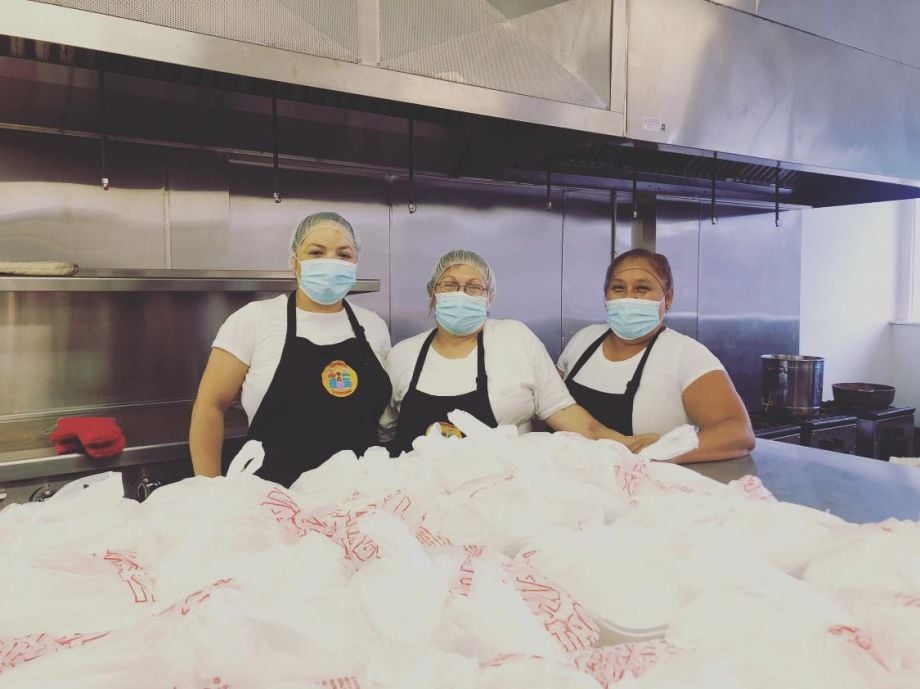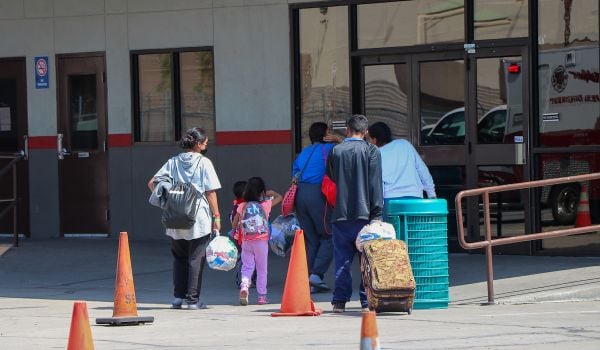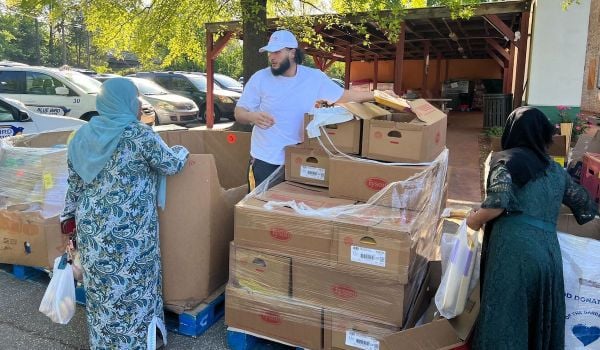Street vendors have been re-shaping Chicago’s economy — officially — since at least 2015. That’s when street vending became legal in the city of Chicago, after years of street vendors leading the struggle for legalization. Excluded from other opportunities, many had been street vending for decades up to that point.
But with legalization came regulation — like new restrictions on boiling corn and preparing tamales at home, which many had been doing before. Starting in 2017, street vendors needed to find and rent out a regulated commercial kitchen space for making tamales, elotes and other dishes to sell legally on the streets.
With the support of the Street Vendors Association, Chicago Community & Worker’s Rights, and the University of Chicago’s Institute for Justice Clinic on Entrepreneurship, some of those street vendors decided it would be best to open their own shared kitchen as a worker-owned cooperative, managing their space collectively as equals. They’re calling themselves Cocina Compartida de Trabajadores Cooperativistas — Cooperative Workers Shared Kitchen, and they just bought a building.
It might have had something to do with who Chicago’s street vendors are, says Martin Unzueta, founder and director of Chicago Community & Worker’s Rights. His organization has worked with street vendors for more than a decade, and has been working with the street vendors who became CCTC since 2016.
There are an estimated 1,500 street vendors across the city, according to Illinois Policy.
“Ninety-nine percent of [Chicago] street vendors come from Mexico, normally from poor communities, and normally they are very close to organizers of co-ops,” Unzueta says. “In Mexico, it’s called ejidos.”
The Mexican Revolution of 1910 led to a massive distribution of land from the feudal “hacienda” system that managed to survive long past the end of Spanish imperial rule. Farm workers could petition the new government for plots of land to manage in groups, known as ejidos — though the government kept the actual deeds to all the land. By the end of 1964, 46 million hectares — an area larger than the state of California — had been granted to 20,000 ejidos with around 2 million members. It was nearly half of all farmland in Mexico.
In the 1990s, under the push for and eventual signing of the North American Free Trade Agreement, Mexican policymakers started pushing to privatize ejidos, seeing them as incompatible with their desired free trade policies. Some ejidos resisted changes. But many lost the privilege to farm on lands granted their communities a generation before. Seeking better options, some of them went north, to Chicago and other cities like New York, where cooperative businesses are seeing a resurgence among immigrant communities, particularly those that are Spanish-speaking.
“So when we began to think about how to organize [street vendors] to create a shared kitchen, we began to think about cooperatives,” says Unzueta.
In working to get their cooperative up and running and eventually buying their own building as a commercial kitchen co-op, the street vendors have continued to re-shape the legal and financial landscape for worker-owned cooperatives in Chicago. These are businesses in which workers have a democratic vote in the management and leadership of the business, in addition to sharing in the profits when the business does well. Some have been around in Chicago for a while, but the legal and financial landscape wasn’t quite built to account for their existence, so they’re still pretty rare.
Others around Chicago had their own roots in cooperatives, from the struggles of people returning from prison and looking for good jobs, or the damage done to Black communities from de-industrialization and disinvestment. In 2019, they all came together to push for a new state law that legally recognized worker-owned cooperatives. Their hope was that being able to incorporate as a Limited Worker Cooperative Association in their state would help with raising funds or applying for loans.
“In stakeholder meetings or funder meetings, one of the reasons they would hesitate is there was nothing in the law that recognizes worker co-ops,” said Renee Hatcher, director of the Community Enterprise & Solidarity Economy Clinic at The John Marshall Law School in Chicago, in a 2019 interview with Next City. “That wasn’t exactly the case but it is certainly helpful for those wanting to form co-ops and for funders if it is explicitly written into law.”
That law passed in 2019. Illinois joined about a dozen other states that have laws explicitly recognizing worker-owned cooperatives, although many other states recognize co-ops in general. In March 2020, the street vendors were one of three worker-owned cooperatives to walk into the state offices and incorporate in Chicago as a Limited Worker Cooperative Association. It was right before government offices closed down for the pandemic.
CCTC planned to rent a building for its members and to defray costs by renting out their kitchen space on an hourly basis when members didn’t need it. During the pandemic, which shut down street vending for many months, the co-op also started taking on contracts to supply meals for emergency relief programs — similar to street vendors in New York plugging into emergency meal supply chains.
The opportunity to buy the building came a bit as a surprise. With support from the Street Vendors Association of Chicago, CCTC members started renting a building in 2017, on 16th Street in the Lawndale neighborhood — not far from the heavily Latino neighborhoods of Little Village and Pilsen on Chicago’s West Side. The building had once been a barbecue restaurant, and Unzueta says that made it easier for them to get the proper licensing in place as a commercial kitchen.
Unzueta says it was not long until the owner approached the group about selling them the building. He gave them a price — $150,000.
“Once we knew the price, we needed to see which bank could help us in order to buy the building,” says Unzueta. “I think we visited seven banks or something like that. The interest rates were too high.”
Being a startup is already one strike against CCTC. Bankers tend to prefer more established businesses, seeing them as less risky. A new food business is another strike — bankers tend to see food businesses as riskier than usual. If you can even convince a bank to offer you a loan as a newer food business, they’re likely to charge a higher than usual rate of interest to compensate themselves for taking on what they see as a higher risk.
The Small Business Administration does offer loan guarantees that help bankers feel more comfortable making loans to smaller or newer businesses, especially restaurants or other commercial food operations. The guarantees cover a portion of the loan amount in case of default — which convinces banks to lower the interest rate they charge borrowers. The SBA’s 504 loan program guarantees billions in small business loans for real estate acquisition or renovation every year, and restaurants, caterers, commercial bakeries and other food businesses are among the most frequent borrowers in the program.
But SBA loan guarantees are not currently accessible to cooperatives. The SBA currently requires business owners with at least a 20 percent stake in the business to sign a personal guarantee putting themselves on the hook for the loan. In many co-ops, no owner is eligible to sign a personal guarantee because no one has at least a 20 percent ownership stake. It’s been a barrier for decades, but there is finally a bill in Congress that would remove it if passed.
There are non-bank lenders in Chicago that have worked with worker-owned cooperatives in the city, even before the 2019 law explicitly recognized them. Salsedo Press, a worker-owned cooperative print shop, has gotten loans over the years from Chicago Community Loan Fund, a non-bank lender and federally-certified community development financial institution, or CDFI.
Other CDFIs and non-bank lenders from other parts of the country have supported co-ops in Chicago. Part of the financing for ChiFresh Kitchen’s new building and renovations came from Shared Capital Cooperative, which is itself a cooperative. New Era Windows, a worker-owned cooperative specializing in energy-efficient vinyl windows in Chicago, has accessed capital through the Seed Commons network of worker co-op loan funds across the country.
CCTC helped bring a new entrant into the worker co-op fold. It turned to IFF, another non-bank lender and CDFI headquartered in Chicago with a $400 million portfolio of loans all over the midwest. IFF was founded specifically to make loans to nonprofit organizations, especially those funded by grants or public dollars for after-school programs, job training programs, programs for seniors and other community programming or services.
In some ways, CCTC wasn’t too different from IFF’s typical clients. It was located in and created to serve a historically marginalized community. It had an explicit social purpose — empowerment and protection of low-income workers — in addition to a way of generating revenue from kitchen rentals and food service contracts. But as a worker-owned cooperative, CCTC was a step outside IFF’s comfort zone.
“What was more new to us was how do you look at a cooperative as a borrower,” says Jocelyn Velazquez, lender with IFF. “We’re not the first, but we needed to do our research to say other people have done this, how can IFF be creative and do the same thing. What are the real risks associated and how can we get comfortable?”
One of the things lenders like to have is a single, main point of contact — an entrepreneur, an executive director, or a chief financial officer. With CCTC, IFF had to get comfortable with making contact with a committee, since one of the main features of worker-owned cooperatives is workers sharing in the responsibilities of leading and managing the business. Also, CCTC was newly incorporated, but the members had been renting the kitchen since 2017, so Velazquez says IFF also considered the fact they had been on-time with rent over the past few years.
Another factor IFF considered was whether CCTC had a plan to invest further into their property after becoming owners. For that, the lender was able to see that the co-op had applied for and won a $114,000 grant from Chicago’s Neighborhood Opportunity Fund, which pools developer fees generated by new development in Chicago’s downtown areas and grants them out to projects on Chicago’s South, Southwest and West Sides. The grant is going to pay for renovations to the property — but the grant funds don’t come up front, so the co-op couldn’t use those dollars to buy the building.
Unlike most lenders, IFF doesn’t use the market value of a property to determine how much it is willing to lend. The conventional practice of lending only a portion of market value is a way to protect the lender. But in historically disinvested communities, market values are artificially low because of discrimination in appraisals or historic disinvestment in the area. The amount a conventional lender might be willing to lend may not be sufficient.
IFF instead looks at its borrowers’ cash flow to estimate how much it would be willing to lend a borrower. Based on CCTC’s cash flow, IFF was able to lend the co-op $150,000, funding the full purchase price of the building with no down payment necessary.
And now that IFF has done it once, Velazquez says the lender is open to working with more worker-owned cooperatives that have a similar impact on their communities.
“Organizations doing community development work come in all shapes and sizes,” says Velazquez. “The landscape is changing and we’re acknowledging our responsibility to respond to that.”
This article is part of The Bottom Line, a series exploring scalable solutions for problems related to affordability, inclusive economic growth and access to capital. Click here to subscribe to our Bottom Line newsletter.

Oscar is Next City's senior economic justice correspondent. He previously served as Next City’s editor from 2018-2019, and was a Next City Equitable Cities Fellow from 2015-2016. Since 2011, Oscar has covered community development finance, community banking, impact investing, economic development, housing and more for media outlets such as Shelterforce, B Magazine, Impact Alpha and Fast Company.
Follow Oscar .(JavaScript must be enabled to view this email address)


















